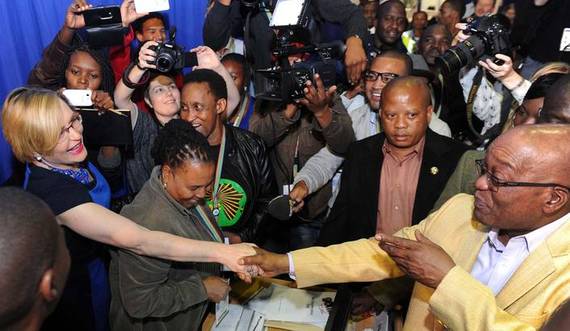The biggest winner in South Africa's May 7th parliamentary election is democracy itself. Twenty years after the first all race ballot, Nelson Mandela's rainbow nation is alive and well in the country of 50 million. The election is a triumph of constitutional government and rule of law.
Eighteen million people, 74% of registered voters, peacefully cast ballots at 22,000 polling stations across nine provinces from the Cape of Good Hope to the Limpopo River on the Zimbabwe border. It was South Africa's 5th democratic election since 1994 and the first since the death of Mandela last December. Voting took place without violence or disruption. Not one of the 29 parties contesting the election cried foul or claimed vote rigging.
Helen Zille congratulates Jacob Zuma on ANC victory
As with neighboring Botswana, the peaceful South African election provides a model for a continent where--sadly--free elections are rare.
As predicted by polling organizations, Mandela's African National Congress won by a landslide. The ANC, founded 102 years ago, has won all five of South Africa's democratic elections, although its victory margin has gradually eroded.
Headed by 72-year-old Jacob Zuma, the ANC got 11 million votes, 62% of the total. The result was only marginally below the 66% it won in 2009.
The official opposition, the Democratic Alliance headed by the premier of the Western Cape, Helen Zille, boosted its vote to 4 million or 22%, up from 16.6 % five years earlier. Significantly, the DA extended its reach beyond minority whites and mixed race voters, winning 700,000 black votes.
The biggest surprise was the rise of the far left Economic Freedom Fighters of expelled ANC Youth League president Julius Malema. His party was founded only eight months ago. Its message of nationalizing mines and banks and redistributing white farms resonated with youth and the poor. The EFF's trademark in the campaign was the red beret popularized by the late Venezuelan leader Hugo Chavez. The EFF won one million votes, 6.3% of the total, more than what had been predicted.
South Africa's new parliament convenes in Cape Town on May 21st. It will again be dominated by the ANC but the ruling party will not have the two-thirds majority it hoped for. A two-thirds majority is needed to amend South Africa's 1996 constitution.
Of the 400 seats in parliament's lower chamber the ANC will have 249, the Democratic Alliance 89, and 25 for the EFF. The remaining 37 seats are split among 10 smaller parties. With the presence of the flamboyant, populist EFF, the new parliament promises to be lively as the ANC is challenged from the left and the right. Parliamentary debate is televised by the South African equivalent of C-Span.
The May 7th election also chose legislatures for South Africa's nine provinces. The ANC triumphed in eight but the DA tightened its hold on the Western Cape where it has been dominant since 2009. The DA majority in the province rose to 59% while the ANC fell to 34%. The DA hoped to win Gauteng, which includes Johannesburg, but fell short with 31%, to 54% for the ANC.
The ANC landslide means that Jacob Zuma can serve a second five-year term as president. However, the ANC's executive council can remove Zuma as party leader and president, an action Zuma employed to oust then president Thabo Mbeki in 2007. That extreme measure is considered unlikely as Zuma appears to have firm control of the party apparatus.
Since 1994 the ANC has governed in a tri-partite alliance with the communists and the trade union federation. The coalition is fraying amid a split in the labor federation and dissension elsewhere. While Zuma's minister of trade and industry is a communist, that party has been unable to persuade ANC leaders to embrace its call for state control of what the communists call an untransformed free market economy.
Zuma's choice of cabinet ministers will be a marker for the future direction of South Africa's economy, the most developed and industrial on the continent. Two years ago Zuma promised large-scale job creation and faster economic growth. That hasn't happened as growth slowed to 2% last year while five percent growth is needed to bring down a 25% jobless rate. Analysts are unsure whether Zuma's new government will hold to its embrace of a mixed economy or become more friendly to business.
Barry D. Wood is a frequent visitor to South Africa.

